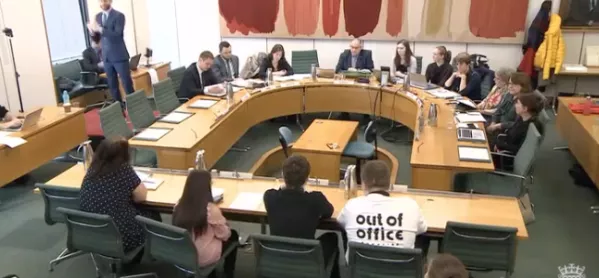Pupils with special educational needs urged MPs today to see them as human and not just as problems to be solved.
The Commons Education Select Committee, which is conducting an inquiry into special educational needs and disability (SEND) education, heard from several young people today about their experiences of the system. The children were identified by their first name only.
“We’re not just SEND,” Ben said. “We are human beings. We are the same as the rest of you. Remember that fact. We’re not a problem, work with us.”
And Eva, another witness, told MPs that she wanted adults to realise that children with SEND also had "dreams and ambitions".
Eva said she felt a quality education, health and care plan (EHCP) should use language in a way that meant “children aren’t defined by labels and not seen as problems to be solved”.
She added later: "People should consider what a child wants to get out of their life, their dreams, their ambitions, their life goals, instead of just seeing it [SEND] as a medical condition and something that needs to be solved quickly."
Quick read: Deaf pupils’ education in ‘crisis’ over teacher shortage
Autism: How to make schools better for autistic pupils
Quick read: Lack of SEND support in classrooms 'dangerous'
There has been ongoing concern about delays to EHCPs or poor-quality EHCPs – both of which then need to be challenged by parents.
The plans set out what support, such as speech therapy, a child is entitled to. An earlier session of the inquiry heard from one MP that a constituent's child had become so stressed by the wait for support that he started self-harming.
Jordan said that EHCPs were being delayed or poorly done. “The child has to live with a plan that is pretty much useless to them. There should be someone who makes sure the plan is of good quality after it is delivered and it is being carried out correctly by staff and not just ignored.”
He gave the example of a wheelchair-using pupil in his school who did not have a physical therapist for months after delays – first in paying for someone to be trained and then waiting for the training to be carried out.
Francesca, 16, who is deaf, told the MPs that being encouraged to use the “disability room” in school at lunchtime made it difficult for her to make friends when she started secondary school. When she later did try to make friends, she found pupils “wary” of socialising with pupils with SEND.
There was also concern from the secondary-school aged pupils giving evidence that support in school was too much about academic support – whereas being involved in social activities, learning to become independent and mental health support were also important to young people.
Ben told MPs that he felt there needed to be more sensitivity to a child’s needs when they find it hard to fit into school norms. “It might have to change a bit because it’s not going to work otherwise but if it doesn’t work [then] they don’t get shipped off, excluded, offloaded or hidden in other places,” he said.




